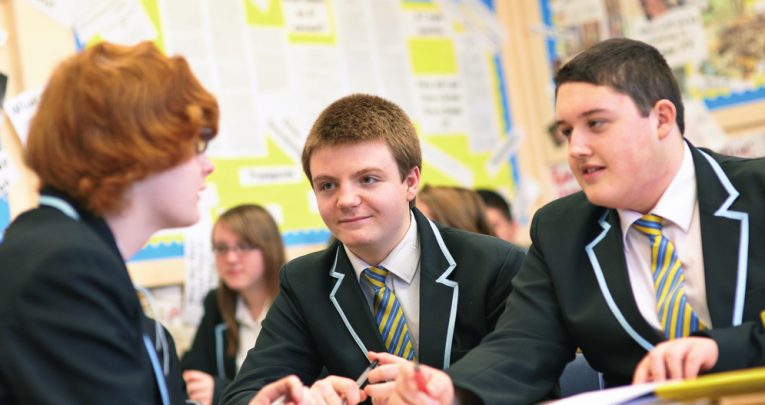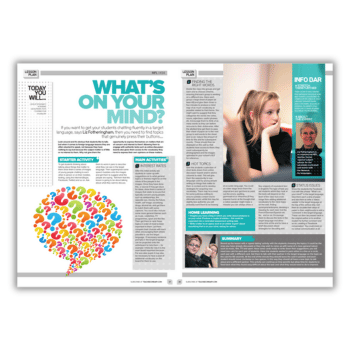MFL speaking activities – Strategies to get all students talking

These simple, effective strategies will get even your shyest students speaking in the target language, right from the start…

- by Teachwire
- Classroom expertise and free resources for teachers

Encouraging students to speak in a foreign language depends on creating opportunity, motivation and confidence. Try these MFL speaking activities and ideas to get everyone in your class talking in your target language…
Student talk vs teacher talk
Who speaks the most in your lessons: you or your students? Speaking skills can only be enhanced if students are given adequate opportunities to speak.
Invite a colleague to observe you in the classroom or watch a video of yourself teaching to see if the balance is right. Increase the number of opportunities for students to speak in pairs or groups.
“Speaking skills can only be enhanced if students are given adequate opportunities to speak”
Shifting the emphasis away from public question and answer sessions has been shown to improve the performance of all students, especially those who are reticent.
Year 7 activities
By creating a safe, supportive environment where pupils in Year 7 know they will never be judged when speaking in the target language, they develop the confidence to give speaking activities a go.
Try beginning each lesson with a brief, low-pressure speaking activity. As pupils become accustomed to this ritual, they’ll soon start to feel more comfortable with the expectation of regularly speaking in another language, even if it’s just in service of a short, low-risk activity.
Teach pupils classroom language and vocabulary at the beginning of Y7, so that they can tell you when they’ve forgotten their book or need to go to the toilet.
Start by using phrases such as ‘Can I have…’, as well as high-frequency core language that you can use with the class when doing the register and throughout the lesson.
Activities for pairs
Pair work exercises are useful as a starter to get pupils attuned to the foreign language. Have a go at these ideas…
Word tennis
Students ‘bat’ words backwards and forwards to each other, miming a game of table tennis. Use to revise:
- sequences of words (days of the week, months, numbers or the alphabet)
- word fields (colours, adjectives or hobbies)
- vocabulary covered in the previous lesson
If your students are more energetic, the game could become volleyball, with students throwing words over an invisible net to each other.
How should I say it?
One student becomes the teacher and instructs their partner in the target language how to describe their weekend, or count from one to 50, using simple adverbs such as slowly, quickly, quietly, loudly, or more adventurous ones like enthusiastically or lazily. The adverb is changed when the teacher makes a ‘stop’ sign.
Language auction
In pairs, students exchange as many words as they can on a topic. You ask which pair can recall the greatest number of words – ‘Who has five words? Who has six words? Ten words?’.
Then challenge the pair who claim to remember the most to repeat them to the rest of the group.
Spot the difference
Each student has a picture of a room with various items of furniture in it. Students spot the differences by asking each other questions, such as ‘Where is the guitar?’; ‘Is there a bookcase in the room?’ etc.
Happy families
Give each student a sheet of pictures of faces, or people, which are numbered or named. Student A describes a face or person to Student B, who guesses the correct number or name as quickly as possible.
New vocabulary activities
Introduce a range of new vocabulary words then split pupils into pairs to try these ideas:
- One pupil deliberately mumbles one of the new words, and their partner has to guess which one it is
- One pupil performs an action of what a word is referring to. Another pupil has to guess which word it is
- Pupils take turns saying the words. One writes each word in the air or on the table with their finger. The other pupil has to identify the word in question
One word each
One student says a word and their partner has to add another logical word to the sentence. For example:
1: Soy / 2: alto / 1: y / 2: tengo / 1: un / 2: perro
The words they use can be sensible or a bit silly, so long as they make sense grammatically. This activity not only helps with more natural, free-flowing speech but it also helps with listening skills, as they have to rely on others to complete the task.
Free MFL lesson plans
- Give pupils the opportunity to express themselves on matters that are of concern to them
- Give language learning a real-world context by thinking about how pupils’ lifestyle choices might impact the future of our planet
- Prepare presentations to ‘sell’ an everyday gadget that offers a solution to a problem
- Use pictures as speaking and writing stimuli
- Run a collaborative learning session based on crepe recipes
More MFL speaking activities
Phone talk
Prepares two printouts, both showing images of a mobile phone. Give them to pupils sitting at opposite ends of the classroom. Play some music while the mobile phone images are passed round the class.
When the music stops, the two pupils holding the printouts speak to each other in the target language. In Y7, this exchange can start with ‘Bonjour, comment ça va?’.
Over time you could add a list of core questions you want the class to answer, based on the vocabulary, grammar and key structures they’ve learnt, and increase the length of time they’re speaking for. It’s all about practice!
To encourage less confident speakers, use ‘recordable speech bubbles’, whereby pupils write their answers onto paper shaped like a speech bubble and record it afterwards.
MFL Jeopardy
In this activity, you provide an answer – for example, “Tengo dos hermanos y una hermana” – and the job for pupils is to respond with the question; in this case, “¿Tienes hermanos?”.
Vary the complexity of the questions, depending on the age range and ability of pupils. You can also ask pupils to provide answers and their peers to provide the question.
Fill in the gap
Provide students with a paragraph or sentences that contain gaps. The challenge is to read out loud and spontaneously fill the gap with any word of their choosing (providing it makes sense). For example:
Me llamo David y tengo dos ________ y un perro. Me gusta jugar al _________ .
The length of the sentence or paragraph will depend on the ability of the class. You can also differentiate by making the gaps all nouns, all adjectives or all verbs.
Four chair challenge
Place four chairs at the front of the room facing the class, then ask for four volunteers. The rest of the class have to ask questions to one of the pupils on the chairs.
If the student answers correctly, then they remain seated where they are. If they answer incorrectly, then they have to swap with the pupil who asked the question.
The aim is to be sitting on the chair by the end of the lesson. Reward those who are with stickers, merits and so on. This is a quick activity that requires no planning and encourages pupils to speak.
Running dictation
This is a lively activity to encourage speaking and teamwork. Stick a selection of phrases or a paragraph on one side of the room or corridor. Divide your pupils into pairs or teams of three and four.
The pupils take it in turns to memorise as much of the phrase/paragraph as they can and then dictate it to someone else in the group, who writes it down.
The group who finishes first (and is completely accurate) wins. If you have access to a large hall, then this is a great game to play there.
Sing songs
There’s a whole internet full of simple songs in different languages out there, some authentic and some written especially for learners.
Alain Le Lait’s YouTube channel is ideal for finding wonderful songs in French, which are perfect for building confidence, improving pronunciation and remembering vocabulary.
- Describe a photo using genuine family snaps or famous paintings.
- Utilise roleplay via ‘speed dating’ partner work or puppetry.
- Hold mock interviews in which pupils pretend to interview celebrities who speak your target language (actors, footballers and other high profile figures).
- Place four photos on the board and ask pupils to decide which is the odd one out. They must then explain the reasons behind their decision in the target language.
- Work in pairs with a stimulus and time limit to come up with as many statements and utterances as they can, using one or more pictures or verbal prompts.
- Play ‘Catch the spy’ (devised by teacher Vincent Everett) (@Veverettmfl). Pupils interview others in the class by asking them a range of questions to try and identify an impostor.
- Invite your headteacher to come into a lesson and witness a performance.
- Play Battleships using the target language.
- Write and recite simple poetry with rhymes.
MFL speaking activities to improve pronunciation
Point to the phoneme
Many students are afraid to speak because they think they will mispronounce words, so build up their confidence, starting with a focus on individual phonemes:
- Display two phonemes on cards – such as ‘ez’ and ‘au’ in French – at either side of the room. Students point to the correct card when they hear you say that sound
- Make it more difficult by reading out a list of words containing the sounds; again, pupils indicate the correct card
- Present students with a list of unknown words, or surnames, containing the sounds, and ask them to work out how they are pronounced
Tongue twisters
It’s easy to forget how difficult it can be for students to master sounds which don’t exist in their first language.
Let students play around with some tongue twisters at tongue-twister.net. The key to boosting speaking is making it fun.
Pronunciation pitfalls
Give pupils a list of words that contain letters (or combinations of letters) that are often mispronounced.
The task for the pupils is to identify the letters that are difficult to pronounce, attempt the pronunciation with a partner, and then try to think of another word that contains the same combination of letters. For example: trois (three) and roi, choix and noix.
The more that we ask pupils to actively recognise these sounds, the more likely they are to remember.
Become exam markers
Play a recording and ask students to assess it using a GCSE mark scheme. Pupils can either mark the recording using all of the criteria or just one aspect of the recording (eg pronunciation).
The recording can be a specimen from the exam board website if the activity is for GCSE pupils. With KS3 pupils, pre-record something by a GCSE or A-level student.
At the end of the activity, pupils share their marks and give justifications using the mark scheme. This task helps pupils to understand the importance of accent and pronunciation.
Teaching transferable vocabulary
Teach pupils chunks of vocabulary they can reuse in different contexts. Think about situations that crop up naturally and regularly in the course of a classroom lesson, which can be exploited in the target language for linguistic purposes.
Pupils arriving late; pupil absence; other teachers entering the room whilst the lesson is in progress; classroom discussions following group work – exploit such moments, and guide pupils to reuse vocabulary and structures from other contexts by showing how they can be extended and adapted.
Over time, this will help them say what they want to say.
Homework activities
For homework, task pupils with using Snapchat to record themselves answering questions, or online services such as Flipgrid, Padlet or Vocaroo to record their answers.
Give them personalised feedback on their pronunciation, vocabulary and use of grammar.
Ask pupils to create videos that describe themselves, their town or their school and send these to partner schools abroad, thus giving the exercise a specific purpose.
Having pupils voice their own characters is a great way to help them gain confidence in speaking, especially for those who feel embarrassed about ‘performing’ in front of their peers.
There are some excellent websites where students can create a character (or avatar) and then record speech in their own voice for the character to deliver.
Use these recordings to mark pronunciation or ask students’ permission to play them on your IWB. The class will find them extremely entertaining.
Overcoming embarrassment
Teenagers are sensitive to making mistakes and can be easily embarrassed. Encourage your pupils to support and help each other, and emphasise that mistakes are a natural part of the learning process.
Aim to promote a positive classroom culture where errors are viewed as learning opportunities, rather than sources of shame or embarrassment.
Allowing pupils to work in pairs or small groups, with fewer of their peers in immediate earshot, reduces anxiety levels and will increase pupils’ willingness to actively participate in activities such as role plays, discussions or language games that involve engaging in conversations.
“Emphasise that mistakes are a natural part of the learning process”
Begin the process with relatively low-stakes speaking tasks, before gradually ramping up the level of complexity and challenge.
Start with short, simple prompts, then progress to more extended dialogues or presentations over time. Doing this lets pupils build their confidence gradually and develop their speaking skills at a manageable pace.
If any pupils are still extremely reluctant to speak, props and learning aids may help. Interactive language learning apps, online language exchange platforms and voice recognition tools can all support additional practice outside the classroom. They enable students to build confidence at their own pace.
If you are fortunate enough to have sixth-form students, try using them as LSAs during speaking activities. This is an excellent way to ensure that more pupils are receiving individual attention.
It’s especially helpful for shyer pupils who might dread speaking out loud in front of larger groups.
Celebrating success
Encourage pupils to provide constructive feedback to their peers, focusing on strengths and areas for improvement. Self-assessment allows pupils to reflect on their progress, track their development and take ownership of their learning journey.
Be sure to acknowledge and celebrate pupils’ verbal communication achievements. Praise their efforts and any progress or improvements, highlighting specific instances where they have overcome challenges.
Recognising pupils’ accomplishments will boost their confidence yet further, and motivate them to continue working on their verbal skills.
More resources
- Read James Stubbs’ blog on his use of target language
- Browse our resources for European Day Of Languages
Thank you to the following contributors for their help with this article:
Dr Amanda Barton is a writer, former MFL teacher and author of Getting the Buggers into Languages (Bloomsbury).
Jennifer Wozniak-Rush (@MissWozniak) is an assistant headteacher for teaching and learning, and an SLE in MFL.
Anthony Cahill is the head of modern foreign languages at Hazelwick School in Crawley, West Sussex.
Dominic McGladdery is a teacher of French, German and Spanish with 25 years’ experience. Visit his blog at domsmflpage.blogspot.com.










